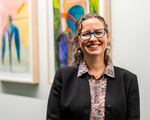
Brandy Westerman, shown here in a provided photo, now oversees Portland's Safe Rest Villages and Temporary Alternative Shelter Sites. She previously served as a senior executive at the Portland-based humanitarian aid agency Mercy Corps.
City of Portland
In October, Portland Mayor Ted Wheeler announced the appointment of Brandy Westerman as the city’s first-ever emergency humanitarian director. She is responsible for the city’s alternative shelter efforts, including seven Safe Rest Villages which provide on-site case management and behavioral and mental health services to help people transition to permanent housing. In July, the city also opened the Clinton Triangle Temporary Alternative Shelter Site in Southeast Portland, the first of six large outdoor shelters the city is planning to open for people experiencing homelessness.
Westerman previously worked as a senior executive at Mercy Corps, a Portland nonprofit providing humanitarian aid in more than 40 countries around the world. She coordinated humanitarian relief efforts in Tajikistan, Afghanistan, Pakistan, Yemen and other countries. Westerman spoke to “Think Out Loud” host Dave Miller about how those experiences overseas have prepared her for this new role, what she has learned so far and her vision for homeless services in Portland. The following highlights from the interview have been edited for length and clarity.
Reflections on people experiencing homelessness abroad to here at home:
“We used a different language to talk about something that’s quite similar. We talk about displacement — populations that were either internally displaced or fled crisis as refugees … Individuals who are affected by trauma, a natural disaster, a manmade disaster, whatever the cause of displacement, it’s often a traumatic experience for somebody to have to be uprooted from their community, from their homes, from their families. There’s a lot of loss often involved … and I think you see that within the homeless population as well. We have people who may have been displaced for a variety of reasons rather than a singular reason … but often have experienced trauma and need to be met with a trauma-informed compassionate response.”
“The Mercy Corps Office is located just in the center of town by Skidmore Fountain. My office window would overlook Skidmore Fountain and I’d see people in crisis … and what really struck me is that these are individuals who our systems within society have failed them and they have largely been falling through the cracks and are not receiving the services that they need to get back on their feet.”
Importance of building trust to effectively provide services:
“Those who have been affected by a crisis are going to carry some of the most valuable important information about what this response needs to look like, so talking to the affected population … through the lens of people that they know and trust.”
“One of the things that stands out to me is trust, and how trust plays out in the ability to have effective services. And I think I’ve known this inherently but really, hearing the stories of where people have had their trust broken in the past, who have maybe accessed services and been failed by those services and what that does to the desire and the interest and motivation to try again … So I think one of the things that really stands out to me is how critical it is to build trust and to follow through on promises as a responder, as a coordinator of shelter or any other service for this population.”
City, county and region more aligned on homelessness than public thinks:
“One thing that really has stood out to me over the past couple of months, these first couple of months in this role, is that the coordination at the operational level between each of these players and entities is much, much stronger than I think the public believes and what stands out in the media. So at the operational level, I’m talking to people at the county, at the [Joint Office of Homelessness Services] on a daily basis, and we are more aligned than I think we’re given credit for … There are a lot of people working at the county who have worked previously at the city, working at the city who have worked previously at the county. … Now, that doesn’t mean that coordination is perfect. It is not. There’s a lot of room for us to get a lot better about how we pool resources and maximize outcomes, but the conversations are happening and I think that there is a level of kind of trust and willingness to pick up the phone and talk to each other at this operational level.”
Nearly half the people leaving Safe Rest Villages found temporary or permanent housing, according to recent report:
“One of the most critical factors is that we are able to build the wraparound services that meet the needs of each and every individual where they’re at when they’re in shelter. … We don’t need case managers with a load of 50 people. They’re not going to be able to give the attention to meet the needs of individuals. We need case managers with a small enough case management load so that they can build those meaningful connections, build trust and help people move into housing … ensuring that there’s strong behavioral health supports, physical health supports, addiction treatment services available (are) also really important pieces of this puzzle that we need to work through.”
Getting used to a different pace of delivering humanitarian aid:
“Working in the regulatory environment here in the United States slows things down. ..The need to comply with local, state, federal rules, that doesn’t exist in the same way in an international humanitarian response. And I fully recognize I have a lot of learning to do in that space to make sure that we can navigate those appropriately.”
Brandy Westerman spoke to “Think Out Loud” host Dave Miller. Click play to listen to the full conversation:
